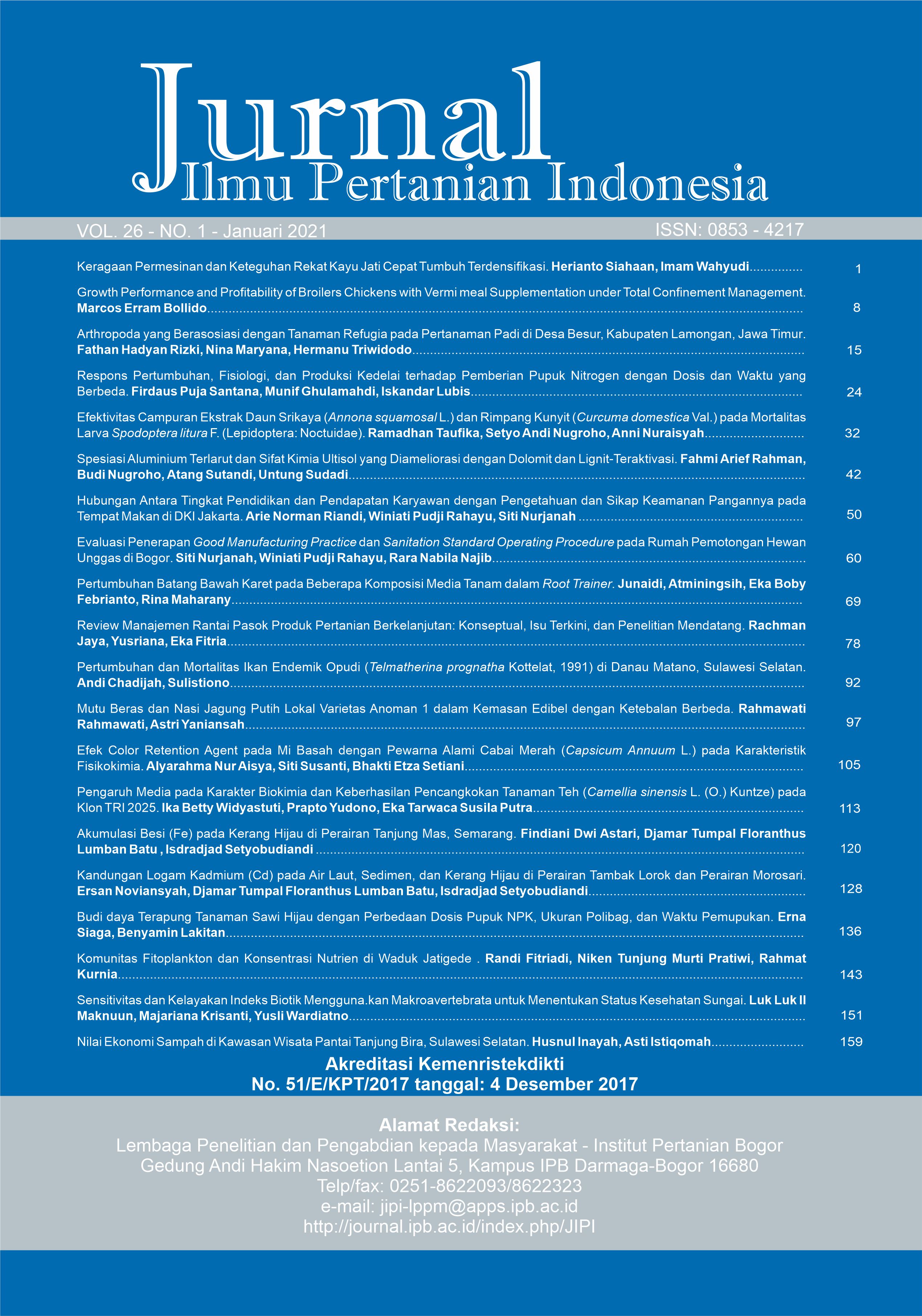Hubungan Antara Tingkat Pendidikan dan Pendapatan Karyawan dengan Pengetahuan dan Sikap Keamanan Pangannya pada Tempat Makan di DKI Jakarta
Abstract
Food safety is an important aspect of consumption behavior, especially for employees in the office. Lack of food safety knowledge and awareness can endanger the health and reduce the productivity of employee. This study aims to describe the level of food safety knowledge and attitudes of employees at food stalls as well as their preferences for lunch at office environment, determine the effectiveness of information media as a source of food safety information and also the role of the government in food safety education and food safety supervision at food stalls. This study used an online questionnaire with 405 respondents who work in the DKI Jakarta. The data collected were analyzed statistically using the SPSS program. The results showed that the characteristics of the employees, such as education level and nett income level, had an effect on the food safety knowledge level and food safety attitudes at the food stalls. Most of employees (87,7%) have a good level of food safety knowledge and 67,7% of employees also have a good level of food safety attitude at food stalls. The results of the Spearman correlation test showed that the level of food safety knowledge and attitude at food stalls was correlated with the level of education and nett income. Most of the employees (37,8%) choose the canteen as a place to eat in the office and some choose food stalls (16,0%) and restaurants (10,1%). Information media considered effective enough for spreading the information of food safety according to employees was social media.
Keywords: attitudes, consumption behaviour, employees, food safety, knowledge
Downloads
References
Alimi BA, Oyeyinka AT, Olohungbebe LO. 2016. Socio-economic characteristics and willingness of consumers to pay for the safety of fura de nunu in Ilorin, Nigeria. Quality Assurance and Safety of Crops & Foods. 8(1): 81–86. https://doi.org/ 10.3920/QAS2014.0494
Anggitasari A, Rahayu WP, Ratnasari Y. 2014. Pengaruh program keamanan pangan di sekolah terhadap pengetahuan penjaja pangan jajanan dan siswa sekolah dasar. Jurnal Mutu Pangan. 1(2): 151–158
Atinkut HB, Tingwu Y, Gebisa B, Qin S, Assefa K, Yazie B, Melese T, Tadesse S, Mirie T. 2018. Factors influencing consumers’ choice of street-foods and fast-foods in China. African Journal of Marketing Management. 10(4): 28–39. https://doi.org/10. 5897/AJMM2018.0572
[BPS DKI Jakarta] Badan Pusat Statistik Provinsi DKI Jakarta. 2020. Provinsi DKI Jakarta dalam angka. Jakarta (ID): BPS Provinsi DKI Jakarta.
[BPOM] Badan Pengawas Obat dan Makanan. 2019. Laporan tahunan BPOM Tahun 2018. Jakarta (ID): Badan POM.
[Dinkes DKI Jakarta] Dinas Kesehatan DKI Jakarta. 2019. Profil kesehatan provinsi DKI Jakarta tahun 2018. Jakarta (ID): Dinkes DKI Jakarta.
Elinda-Patra MW, Dewanti-Hariyadi R, Nurtama, B.2020. Modeling of food safety knowledge, attitude, and behavior characteristics. Food Research 4(4): 1045–1052. https://doi.org/ 10.26656/fr.2017.4(4).375
Henson S, Majowicz S, Masakure O, Sockett P, Jones A, Hart R, Carr D, Knowles L. 2006. Consumer assessment of the safety of restaurants: the role of inspection notices and other Information cues. Journal of Food Safety. 26(2006) 275–301. https://doi.org/10.1111/j.1745-4565.2006.000 49.x
Jaini AB, Ahmad NA. Zaib ZM. 2015. Determinant factors that influence customers’ experience in fast food restaurants in Sungai Petani, Kedah. Journal of Entrepreneurship and Business. 3(1): 60–71
[Kemenkes] Kementrian Kesehatan Republik Indonesia. 2016. Peraturan menteri kesehatan Republik Indonesia nomor 48 tahun 2016 tentang standar keselamatan dan kesehatan kerja perkantoran.
[Kominfo] Kementrian Komunikasi dan Informatika. 2019. Laporan Tahunan 2018. Jakarta (ID): Kominfo.
Kilic O, Eryilmaz GA. 2015. Factors affecting consumers’awareness of food safety. Agro Food Industry Hi Tech. 26(3): 43–46
Ma L, Chen H, Yan H, Wu L, Zhang W. 2019. Food safety knowledge, attitudes, and behavior of street food vendors and consumers in Handan, a third tier city in China. BMC Public Health. 19(1128): 13–26
Nurgiyantoro B, Gunawan, Marzuki. 2015. Statistik Terapan untuk Penelitian Ilmu Sosial: Teori dan Praktik dengan IBM SPSS Statistic 21. Yogyakarta (ID): Gadjah Mada University Press
Pergub DKI Jakarta. 2019. Peraturan Gubernur DKI Jakarta Nomor 121 Tahun 2019 Tentang Upah Minimum Provinsi Tahun 2020.
Prawira IKPY, Wijaya CH, Prangdimurti P. 2016. Korelasi informasi nilai gizi terhadap keputusan pembelian biskuit dan kukis oleh konsumen Jakarta dan sekitarnya. Jurnal Mutu Pangan 3(2):138-144
Rahayu WP. Fardiaz D, Kartika GD, Nababan H, Fanaike R, Puspitasari R. 2016. Estimation of economic loss due to food poisoning outbreaks. Food Science and Biotechnology. 25(s): 157-161. DOI 10-1007/s10068-016-113-8.
Riadi E. 2015. Metode Statistika: Parametrik dan Nonparametrik. Tangerang (ID): Pustaka Mandiri.
Sanlier N. 2009. The knowledge and practice of food safety by young and adult consumers. Journal Food Control 20: 538–542. https://doi.org/10.1016/ j.foodcont.2008.08.006
Sevilla CG, Ochave JA, Punsalan TG, Regala BP, Uriarte GG. 2007. Research Methods. Quezon City (PHI) : Rex Printing Company.
Taherdoost H. 2016. Sampling methods in research methodology; how to choose a sampling technique for research. International Journal of Academic Research in Management. 5(2): 18–27. https:// doi.org/10.2139/ssrn.3205035
Totelesi H. 2011. Tinjauan pengetahuan, sikap dan praktik penjamah makanan tentang keamanan pangan dan sanitasi di rumah makan sekitar kampus IPB Darmaga [Skripsi]. Bogor (ID): Institut Pertanian Bogor.
Vyas S, Kushwaha A. 2017. Consumer’s perception and knowledge concerning safety of street food services in Pantnagar, India. Journal of Food Safe & Hygiene. 3(1–2): 34–39
This journal is published under the terms of the Creative Commons Attribution-NonCommercial 4.0 International License. Authors who publish with this journal agree to the following terms: Authors retain copyright and grant the journal right of first publication with the work simultaneously licensed under a Creative Commons Attribution-NonCommercial 4.0 International License. Attribution — You must give appropriate credit, provide a link to the license, and indicate if changes were made. You may do so in any reasonable manner, but not in any way that suggests the licensor endorses you or your use. NonCommercial — You may not use the material for commercial purposes.
























